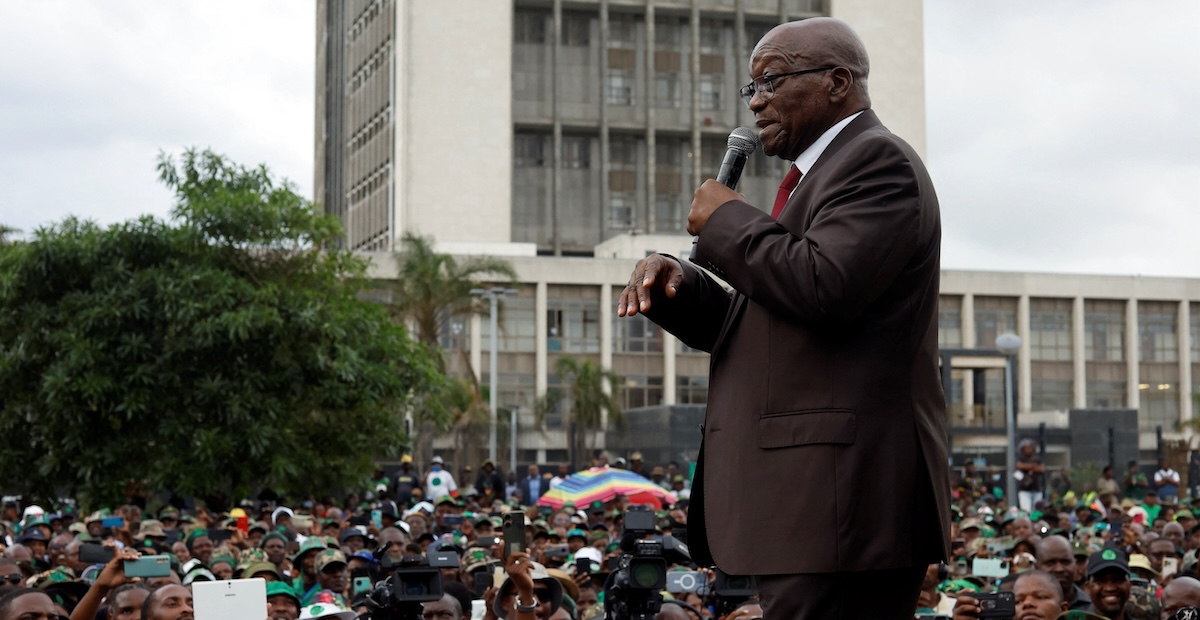Loading player
Former South African President Jacob Zuma will be free to apply in the elections on May 29th, when the 400 seats in the National Assembly will be renewed and a new president will then be elected. On Tuesday a court accepted the appeal of Zuma’s new party and annulled the recent decision of the Electoral Commission which had excluded the former president from running due to his criminal record.
Zuma is 81 years old and was president of South Africa from 2009 to 2018. Since 1959 he had been part of the African National Congress (ANC), the party that has governed the country since the 1990s, and presided over it between 2007 and 2017.
In December 2023, surprisingly, Zuma criticized the ANC and accused it of having lost the radicalism of its beginnings. He then announced his support for uMkhonto weSizwe (“spear of the nation”, abbreviated to MK), a recently founded party which takes its name from that of the armed wing of the ANC, when the liberation movement fought against the regime of apartheid, that is, that period in which South African society was officially and formally segregated on an ethnic basis: «My conscience does not allow me to lie to South Africans and to act as if Ramaphosa’s ANC (Cyril Ramaphosa, current president of the country and of ‘ANC, ndr) was that of Luthuli, Tambo and Mandela (historic leaders of the ANC, ndr),” he said during a press conference on December 16. In January the ANC expelled him because, as general secretary Fikile Mbalula said, his conduct was “in conflict” with their “values and principles”.
According to Susan Booysen, professor at the Wits School of Governance in Johannesburg and an expert on the ANC, Zuma’s real polemical target has become Cyril Ramaphosa himself: “He has a total hatred towards him, and a hatred for what the ANC has become under Ramaphosa.” Ramaphosa was Zuma’s vice-president, and when the latter was ousted from the government in 2018 he took his place, trying, from then on, to appear as the antithesis of his predecessor, presented as the symbol of corruption.
Over the years Zuma has been involved in several corruption scandals and trials and in 2021 he was sentenced to 15 months in prison for failing to show up at the hearings in the trial linked to an affair dating back to 1999 which involved the purchase of weapons produced by the French company Thales by the South African government (after less than three months Zuma was released from prison for health reasons).
Because of this condemnation, at the end of March the South African Electoral Commission excluded Zuma’s candidacy from the elections, without giving a precise reason: it explained that it had accepted an objection without however indicating who had presented it. On April 2, MK took legal action to have this decision overturned, which has now been upheld. The MK, through its spokesperson Nhlamulo Ndhlela, said Zuma will be back in parliament and will be the party’s presidential candidate.
The May elections will be the most competitive since the end of apartheid in South Africa in 1994. Discontent with the ANC has in fact increased due to the great difficulties that the party has had in recent times on various issues, from the management of crime to corruption scandals. Although the apartheid system ended almost thirty years ago, South Africa is considered one of the countries with the greatest social and economic inequality in the world. The coronavirus pandemic has worsened an already critical situation, the economy has contracted, around 2 million people have fallen below the poverty line and 40 percent of the population is without work.
According to various political analysts, the ANC risks losing its majority in parliament for the first time. In that case he would be forced to form a coalition to remain in government. Polls give the ANC just over 40 percent of the vote, the main opposition Democratic Alliance party around 27 percent and the MK 13 percent. Zuma still enjoys a certain popularity among the South African population and his participation in the elections could have significant consequences on the future political balance of the government: Zuma and his new party could in short cause the ANC to lose votes, weaken the current president Ramaphosa and make it probable that he may be forced to resign after the elections due to the unsatisfactory result obtained by his party.
– Read also: South Africa wants more wild animals to be eaten, also for environmental reasons
